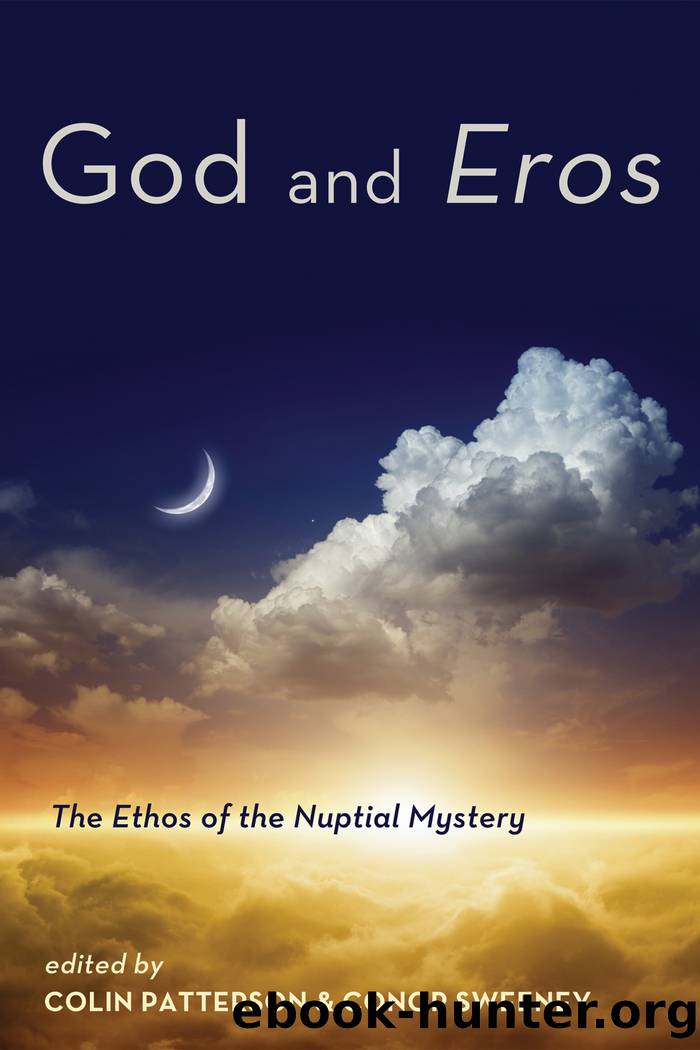God and Eros by Patterson Colin;Sweeney Conor;

Author:Patterson, Colin;Sweeney, Conor; [Patterson, Colin]
Language: eng
Format: epub
ISBN: 9781498280136
Publisher: Wipf and Stock Publishers
Published: 2016-01-07T08:00:00+00:00
127. Cf. Scola, The Nuptial Mystery; Ouellet, Divine Likeness.
128. Ouellet, Divine Likeness, 59.
chapter 8
A Constructive Approach to Secularism
colin patterson
Introduction
The Catholic Church is losing the battle with secularism. Part of the problem is that she has grown accustomed to working within the rulesâthe rules, that is, of secularism itself. And those rules are heavily weighted against the mission of the Church. Yet the Bridegroom does not desert his Bride, and one does not have to dig far to discover resources that might be useful for the conflict. Although in itself the work of the Second Vatican Council does not provide any more than indicators and directions, their suggestive power is significant. Part of this essay will consider the impetus given by the council especially as it relates to the question of how Catholics might start afresh in combating the corrosion of secularism.
But talk of battle and conflict is not especially âconstructive,â so we need to affirm that there is much in secularism from which the Church has learned and can continue to learn. The aim is not the total annihilation of secularism, but rather a serious and sustained engagement with it, one marked by ground rules that allow for such an engagement. We will therefore also give some thought to how this needs to shape our approach to it. I take the term âsecularismâ in the broad sense as the post-Enlightenment acceptance of the principle that governments are to work for worldly ends, that the public sphere is to operate on the basis of this-worldly rationality, together with the justifying ballast that provides it with such widespread approval.
The task then is to draw upon key conciliar teachings, together with some post-conciliar elaborations and consider where they lead us in our efforts to reconfigure our relationship with secularism.
The Problem
Let us begin by briefly rehearsing to ourselves the âsecularismâ problem we as Catholic faithful face. When we view dispassionately the efforts of the Catholic Church, hierarchy and laity, to bring especially the Western world to an acknowledgment of the truth of Christ, we would have to say that things have not gone well. The facts are well enough known and there is no benefit in examining already well-trodden paths. Yet one would have to say that, in the face of decades of failure and religious/moral decay, recent trends continue to surprise. In the space of eight years to 2012, on the question of same-sex marriage, a commonly recognized proxy for attitudes toward religiously based moral beliefs, Australiansâ support for it rose from 38 percent to 62 percent.129 Even the United States, that engine of Western culture, the nation whose strong religiosity has to date been the exception that called into question the thesis that social development necessarily leads to loss of religious commitment, even there we are now observing recent sudden and rapid growth in nonreligious conviction. In 2007, 15 percent of the population owned no religious affiliation, and this figure had grown to 19.6 percent in 2012âa mere five years later.
Download
This site does not store any files on its server. We only index and link to content provided by other sites. Please contact the content providers to delete copyright contents if any and email us, we'll remove relevant links or contents immediately.
Getting It, Then Getting Along by L. Reynolds Andiric(655)
Religion and Politics Beyond the Culture Wars : New Directions in a Divided America by Darren Dochuk(575)
Global Justice, Christology and Christian Ethics by Lisa Sowle Cahill(429)
Positive Psychology in Christian Perspective: Foundations, Concepts, and Applications by Charles Hackney(355)
Forgiveness and Christian Ethics by Unknown(350)
Douglas Hamp The First Six Days by Unknown(297)
The Horrors and Absurdities of Religion by Arthur Schopenhauer(271)
Insurgency, Counter-insurgency and Policing in Centre-West Mexico, 1926-1929 by Mark Lawrence(267)
Middle Eastern Minorities: The Impact of the Arab Spring by Ibrahim Zabad(250)
Christian Martyrdom and Christian Violence by Matthew D. Lundberg;(243)
Beyond Heaven and Earth by Gabriel Levy(237)
The Oxford Handbook of Greek and Roman Mythography by R. Scott Smith;Stephen M. Trzaskoma;(235)
God and Eros by Patterson Colin;Sweeney Conor;(230)
The Bloomsbury Reader in Christian-Muslim Relations, 600-1500 by David Thomas;(225)
Autobiography, Volume 2: 1937-1960, Exile's Odyssey by Mircea Eliade(216)
Cult Trip by Anke Richter(212)
Witches: the history of a persecution by Nigel Cawthorne(211)
An Introduction to Kierkegaard by Peter Vardy(202)
The Global Repositioning of Japanese Religions by Ugo Dessi(196)
